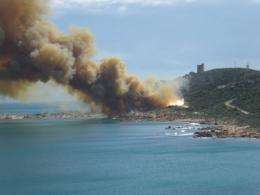On 28 April 2009, a qualification test firing of the third stage solid propellant motor for Europe’s new small launch vehicle took place at the Salto di Quirra Interforce Test Range in Sardinia, Italy.
On 28 April, the final qualification test firing of the third stage solid propellant motor for Europe’s new small launch vehicle took place at the Salto di Quirra Interforce Test Range in Sardinia, Italy.
At 15:30, the peace and quiet of the Sardinian coast was suddenly interrupted by a powerful, deep roar as a Zefiro 9A motor ignited for its final qualification-firing test. The motor took almost two minutes to completely burn its propellant load, during which time engineers and technicians, representatives of Avio, ELV and ESA/IPT held their breath, waiting for the outcome of this important test.
The main objectives of the test were to verify the behaviour of the Zefiro 9A motor in a fully flight-representative configuration, to confirm the design performance and to collect information for system studies at stage level.
As soon as the test was over, the project team met in order to verify the preliminary results for ballistic performance (pressure and thrust curves) and the thrust vector control behaviour. This first analysis confirmed the overall success of the test.
After the first qualification test, completed in October 2008, Tuesday’s firing was the final step in the complete qualification test programme for the Zefiro 9A. This test also completes the overall ground qualification test campaign for all three Vega solid rocket motors.
For Massimo Panicucci, Product Assurance Manager in the Vega Integrated Project Team, this was the sixth Zefiro solid rocket motor static firing test. “A firing is the last verification step following a long series of reviews and key points where quality representatives of industry and ESA scrutinise and certify all the operations necessary for the correct execution of the test. This success brings me further motivation for the milestones that still have to be accomplished before the Vega qualification flight.”
The Zefiro 9A motor, 3.17 metres long with a diameter of 1.92 metres, is loaded with 10 tonnes of solid propellant and forms the third stage motor of the Vega launcher.
Vega
Vega is a single-body launcher composed of three solid-propellant stages and a liquid-propellant upper module. It is approximately 30 meters high and weights a total of 137 tonnes at liftoff. The benchmark for Vega’s in-orbit launch capacity is 1500 kg into a 700 km-altitude polar orbit used by many scientific and Earth observation missions.
Vega, together with the mid-class Soyuz launcher, will ensure that a full range of launch services will be available for Europe, thereby allowing optimised mission planning based on the exact performance required in each case for the lowest cost.
Provided by European Space Agency (news : web)






















